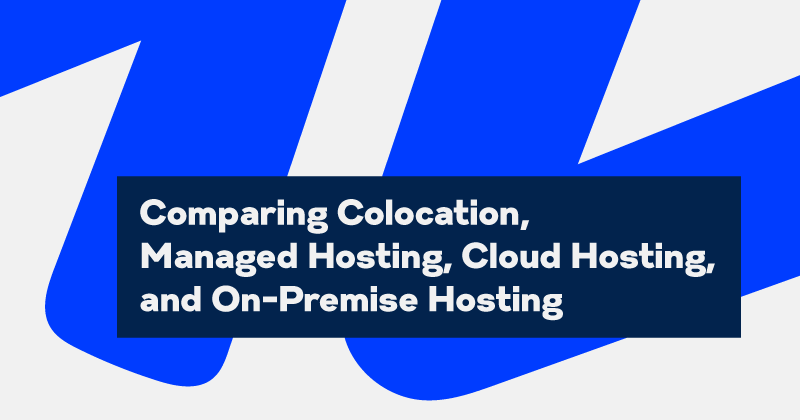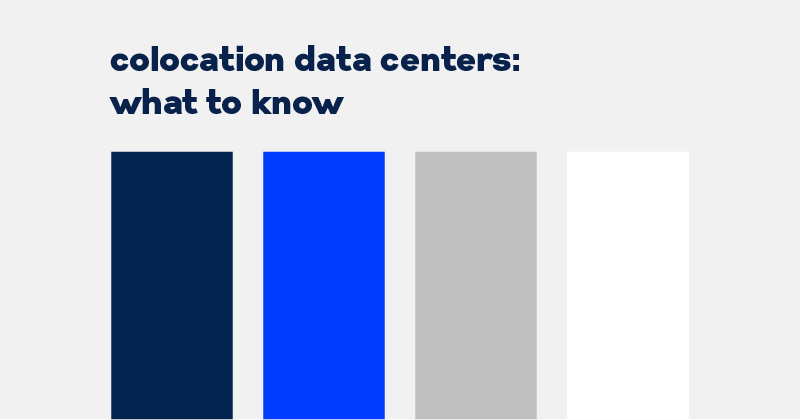Building the Right Hosting Strategy: Colocation vs Managed Hosting vs Cloud

When you’re running a business, choosing the right infrastructure is essential. One of the first decisions you’ll face is how to host your applications and data: colocation vs managed hosting vs cloud—or even on-premise. Each hosting strategy has its pros and cons, and understanding the differences is key to making the best choice for your organization’s needs.
What Is Colocation?
Colocation allows you to rent space in a secure, third-party data center while using your own servers and equipment. While you maintain control over the hardware and software, the colocation provider is responsible for essentials like power, cooling, physical security, and connectivity.
This model is ideal for companies that want to retain control but don’t want the overhead of maintaining a data center facility. When weighing colocation vs managed hosting vs cloud, colocation is often chosen for its blend of autonomy, performance, and cost efficiency.
Key Benefits of Colocation
- Cost-effectiveness: Infrastructure is shared, reducing your overall investment in facilities, security, and power redundancy.
- Scalability: Easily scale your footprint as business needs evolve.
- Disaster recovery: Use colocation as a reliable DR site to safeguard critical data.
- Operational control: You determine your hardware and software environment.
- Security and compliance: Benefit from enterprise-grade physical and digital security systems.
What Is Managed Hosting?
Managed hosting is similar to colocation in that your workloads are housed in a third-party facility. The difference? The hardware and day-to-day management are fully handled by the provider.
When deciding between colocation vs managed hosting vs cloud, managed hosting is a great option for businesses that want dedicated infrastructure without the burden of technical upkeep. You get access to a secure, monitored environment—without needing in-house IT resources.
Key Benefits of Managed Hosting
- Lower capital requirements: No need to purchase or manage hardware.
- Hands-off support: IT experts handle maintenance, monitoring, and troubleshooting.
- Scalability: Easily expand or reduce resources as needed.
- Security: Managed providers offer built-in compliance and cybersecurity features.
What Is Cloud Hosting?
Cloud hosting removes the physical infrastructure entirely. Your data and apps are stored and run on virtual servers in a cloud provider’s environment.
For many, the colocation vs managed hosting vs cloud conversation includes cloud for its flexibility and rapid deployment. However, industries with strict compliance requirements may find it less ideal due to limited control over where data resides.
Key Benefits of Cloud Hosting
- Elastic scalability: Add or remove resources instantly based on usage.
- Operational agility: Deploy environments quickly and globally.
- Cost control: Pay-as-you-go pricing minimizes waste.
- Redundancy: Built-in failover and high availability options.
What About On-Premise Hosting?
In the colocation vs managed hosting vs cloud debate, some organizations still opt for on-premise. This traditional model keeps everything—hardware, networking, and data—at your own facility. While it offers total control, it comes with significant responsibility and cost.
Key Benefits of On-Premise Hosting
- Full control: Custom tailor your infrastructure to meet exact needs.
- Immediate access: In-house staff can directly manage and service equipment.
- Data sovereignty: Maintain total ownership of sensitive or regulated data.
Which Hosting Option Is Best for Your Business?
Choosing between colocation vs managed hosting vs cloud depends on several factors:
- Your internal IT capabilities
- Budget and capital expenditure preferences
- Compliance and security requirements
- Desired level of operational control
- Growth and scalability needs
For some businesses, a hybrid approach combining colocation for control and cloud for flexibility delivers the best of both worlds.
Transform Your Infrastructure with US Signal
At US Signal, we help you evaluate the best path forward—whether that’s colocation, managed hosting, cloud, or a hybrid solution. With a robust data center footprint, a secure Midwest-based fiber network, and a full suite of managed services, we’re here to meet your evolving infrastructure needs.
Ready to future-proof your hosting strategy? Contact US Signal today to explore the right mix of services for your business.



